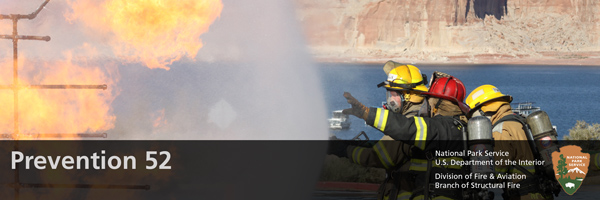
I still remember the park division chief who investigated a report of a propane odor in one of the seasonal apartments. Upon confirming the odor and determining that the leak came from the kitchen, the supervisor lit the propane stove to see if it still worked and the kitchen flashed like a fireball. Luckily, there was very little damage and no one was injured. But the story could have ended far differently. Between 2003 and 2007, natural gas and propane fires caused more than 3,200 residential fires, resulting in 77 deaths, 287 injuries, and more than $100 million in property damage.
Propane can be safe and reliable, and is used extensively in campers, manufactured homes, agricultural applications, rural homes, and businesses. It is stored in containers of all sizes, from small hand-held cylinders for cooking stoves to huge tanks holding thousands of gallons. The danger of propane is that it is heavier than air and will settle in low spots and hug the ground, not allowing it to escape when contained within the walls of a building. Because it's explosive in concentrations as low as 1%, following these P52 safety tips could be a life-saver.
When working around your park, ask yourself these questions:
- How are the buildings heated? If by either propane or natural gas, do you know where the emergency shut-off valve is located? Have you ever checked the valve to see if it is accessible and more importantly, operable?
- What happens in your park when an underground propane line is accidentally broken? Should the park contact the park engine company or the local fire department?
- If park residents complain about the smell of propane in the government housing area and it's discovered the propane storage facility was "overfilled," what actions are taken to correct the potential emergency? Are park residents informed?
Every park should have a plan in place to deal with the various types of propane emergencies that could present themselves, including fires, leaks, accidentally broken lines, and overfilling.
Fire Info for You
Employees
Propane safety takes many forms. One simple question to ask yourself is "Can I store my portable propane tank for my outdoor grill in the garage or house?" For this answer and many others, watch this video.
Firefighters
Propane and natural gas emergencies are extremely common. What training and awareness programs have you presented at the park level to handle this emergency? Check out this website and review the emergency training scenarios. Remember, by failing to prepare you are preparing to fail. (Ben Franklin)
Take Action
- If you smell gas (or propane) do not light appliances; get out of the building immediately and contact your emergency service provider.
- Carefully inspect your propane tank (including gauges, connectors, valves, and controls). Do not use propane cylinders if they are dented, gouged, bulging, fire-damaged, corroded, excessively rusty, or have other forms of visible external damage.
- Do not store cylinders inside enclosed structures or in areas where the cylinder would be exposed to excessive heat.
- Do not dispose of unused propane by opening the valve and venting to the atmosphere. Take the cylinder to your propane supplier for disposal.
NPS Fire Facts
Propane fires and emergencies are extremely common within the National Park System. Propane is used in remote parks and in recreational vehicles for heating and cooking; propane is also increasingly used as an alternative fuel source for vehicles. Portable propane cylinders come in many sizes for portable cooking stoves and appliances.
Every park should have a plan in place to deal with the various types of propane emergencies that could present themselves, including fires, leaks, accidentally broken lines, and overfilling.
Last updated: November 2, 2016
